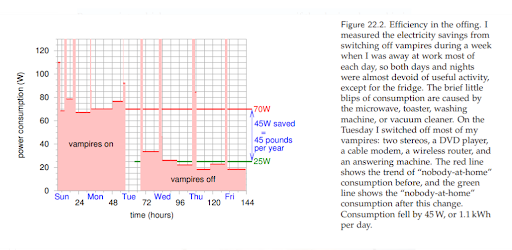[Today we have the pleasure of publishing a guest post from Amandine Alexandre, who is a journalist and copywriter – more details are below the article]
Last month, I switched energy supplier to avoid a significant tariff hike. Guess what? This week, my new supplier has informed me that it was increasing its electricity tariff. It’s not surprising considering that wholesale prices have gone up but still…
Now, more than ever, is the time for me to stick to the energy saving plan I put together last autumn. I’ve done my research and identified 10 good tips to reduce electricity consumption. I share them with you in this article.
1. Let the sunshine in.
Roll up the blinds, open the curtains : let natural light flood into your house and switch off the lights in the morning as soon as possible. In the evening, turn the lights off when you leave a room. Also, limit the number of lamps and other sources of artificial light in your house. The more lights, the more lighting is used.

(Image: Daoudi Aissa)
2. Play LED detective.
Are you sure all your lights are LEDs? Even your security lights? Check them out.
LEDs are the most energy efficient type of bulbs. They use 90% less energy than incandescents. “If the average UK household replaced all of their bulbs with LEDs, it would cost about £100 and save about £35 a year on bills”, the Energy Saving Trust informs us.
3. Do not feed the ‘vampires’.
Don’t let your desktop computer, printer and any device that can be turned off on standby.
A survey done by several government departments in England in 2010-2011, Powering the Nation, has shown that domestic background standby consumption costs households between £50 and £86 a year. Did you know that power points consume energy even if the device plugged in is not on? It does save energy as demonstrated in the graph below. Kill off the ‘vampires’!
4. Cool down your wash and give your tumble dryer the cold shoulder.
Resisting the temptation to use the tumble dryer is hard, especially when drying clothes outside is not an option. The crucial point is to make it as practical as possible for you to dry your clothes in a more energy efficient way.
Buy a compact and sturdy airer you can keep by the side of your washing machine or invest in a pulley airer if suitable. You could also have a retractable washing line in your bathroom.
Ensure that the room where you dry your clothes is well ventilated.
5. Smaller is better.
If you are considering replacing your fridge – the biggest source of energy consumption of all the appliances in your house – do not go for a big fridge. Same thing for TVs.
6. Buy the best energy rated appliances.
An A rated fridge, freezer or fridge-freezer is a third more efficient than the average of all the other less efficient appliances. Find out about the new energy labels here.
Remember as well that fridges and freezers are less efficient when they need defrosting. Defrost your fridge and freezer regularly. Yes, it is a chore.
7. Gamers, you’re not going to like this…
I was shocked to find out the amount of electricity used to power up entertainment devices. According to Powering the Nation 2, a report summing up the findings of the same study mentioned previously, English households spent 553kWh a year or £80 on powering game consoles and other entertainment devices.
If you add to that electricity spent on breadmakers, coffee machines, fryers and yogurt makers it totaled almost £100 per household per year.
8. Be smarter.
Smart meters tell you how much electricity and gas your household uses in real time. They should help you to get a better grip on your energy consumption. Smart meters are installed for free by energy suppliers.
9. Are you overfilling?
Aren’t we all? In 2013, the Energy Saving Trust (EST) did a survey and found that “three-quarters of British households overfill their kettles, wasting a total of £68m each year”. We could save £6 per year on our electricity bill by heating up only the right amount of water each time. It’s not much but it all adds up.
10. Do not buy an aquarium!
Probably the easiest advice to implement. If anyone in your family suggests buying an aquarium, let them know that on average aquariums cost £40 in electricity per year. A hamster may be a better option. They power their own wheel and can even generate some electricity.

(Image: Henry Lay)
Since I started implementing these tips last October, I’ve noticed a slight decrease in my family electricity consumption. Since then, we have had a smart meter installed. I am quite confident that we can decrease our energy consumption by 10% by next October.
[Author Notes: Amandine Alexandre is a journalist and copywriter. Her mission is to help communicate with clarity and empathy. Removing barriers to good communication is her credo.
‘You may feel like you need to use buzzwords to prove that you are a competent, up-to-date professional or business owner but communication based on simplicity, honesty and facts is a much safer investment’, she advises.
Amandine can help find the right tones of voice and build a content strategy – both essential steps in building and developing long lasting relationships.
You can find Amandine’s profile on LinkedIn or email her directly (amandine.london@gmail.com).]




